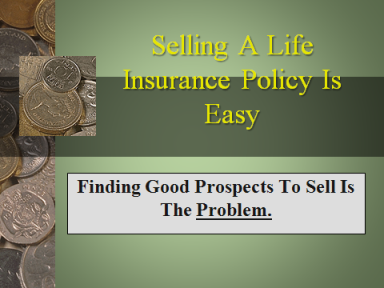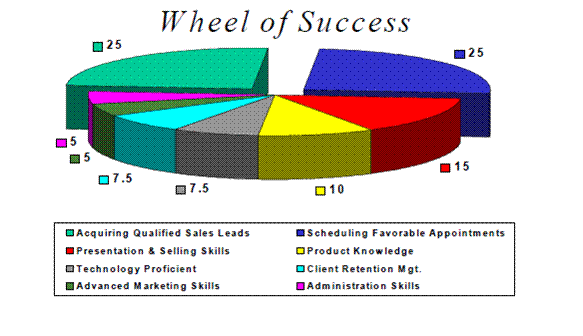- Home Page
- 8 Insurance Selling Tips
- Qualify for Life Insurance
Determining
If A Sales Lead Can Qualify
For Life Insurance
Every article on this website is like a mini-training school. use the nav bars on either side of this page to locate your area of interest or subject you need help with.
What’s So Difficult About Selling Life Insurance?
What’s
So Difficult About Selling Life Insurance?
Article # 3
Written By John Lensi, CLU, ChFC, RHU, REBC, CMFC, LLIF
Why a misdiagnoses can occur?
Determining
if a sales lead can qualify for life insurance for the
most part is a
given (passing criteria #1- see our previous article). Examining
typical underwriting statistics,
we would find that close to 96% of all proposed insured’s are able to
receive a life insurance policy.
Granted, this encompasses table rated
and/or flat extra issues, but the decline rate is in the area of 4% for
most life insurance companies. So unless a producer focuses prospecting
efforts on nursing home patients, this first criterion should not pose
much of a prospecting problem.

Determining
if a prospect can afford a recommendation for life
insurance, for the most part, again falls into the
category of a
“given”. Meaning, producers tend to see this criterion as an obvious
and easy one to screen for. The afford ability criterion is directly
related to the producer’s source of lead generation and is a reflection
of the market segment targeted. Most producers are able to avoid
generating sales leads where there is a low social economic profile to
a market segment.
It should be kept in mind most carriers’ life product portfolios range
from low cost term insurance through various forms of permanent equity
based products.
Therefore, meeting the ‘affordability’ criterion can usually be met
without much difficulty. The bigger challenge is “raising the bar” in
prospecting for more affluent clients which generally results in better
retention and larger size cases.
Moving to criteria three of who can qualify for life insurance.

We find – at least to me – an
interesting phenomenon occurring quite often in the life insurance
business, particularly with inexperienced producers. The phenomenon I’m
referring to is the ineffective
producer having a strong tendency to
prospect only on the basis of locating people in the general public who
have what I call an “obvious identifiable need” for life insurance
(criterion three). These are people who have had a readily identifiable
change in their life. These “life-events” are generally associated with
a dependent status change, a financial change, or a martial status
change.
Examples include engagements, marriages, childbirth, adoptions, buying
or selling a home, promotions, starting a new business, etc. These are
real life events that take place daily in the marketplace. An insurance
sales person can easily link a need to life insurance protection to any
of these occurrences. Knowing most people in these situations probably
don’t have sufficient life insurance coverage and most likely can
qualify for insurance, a light goes on with the ineffective
producer,
they have found their prime prospects.
Consumer research indicates the vast majority of the general public is
grossly under insured (life insurance). Although each person’s
financial
protection needs are different, roughly 90% of the adult age population
in this country has less than $150,000 of total life insurance coverage
from all sources – including employer provided group term. Making sure
prospects pass the criterion for having a need for life insurance is
again, pretty much a “given”.
We haven’t cleared the hurdle for criteria four.
Examining criteria four is critical to understanding if a producer is marketing to qualified prospects. Keep in mind what I stated earlier, if a prospective lead passes the first three criteria and fails the fourth, the prospect is not a qualified sales lead and as a result the producer is working less efficiently then they should.
Here’s a quick example to make this point clearer.
President and Mrs. Obama – at least from our distance – would qualify
for criteria
one, two, and three. Looking at prospect ‘Obama’, he gets
regular check-ups and exercise and is in good health.
Therefore he would most likely have the insure-ability to qualify for
life insurance (criteria one satisfied). He has the “ability to pay”
with his $400,000+ government salary (criteria two satisfied). He has
an apparent planning need – two young daughters and a nonworking spouse
(criteria three satisfied). Looks like a viable prospect so far…
Moving to criteria four
Being able to be seen on a favorable basis as
a result of third party influence (TPI). I’ll let you answer if he’s a
qualified prospect or not.
Unless you know Barack personally, you’re not going to secure a
favorable face to face appointment. Trust me, when I was a young
producer right out of college, I called the White House and tried
[unsuccessfully] to get an appointment with the President. I was lucky
the FBI didn’t try to revoke my Registered Rep status at the time.
Criteria
four
is the key to what makes a qualified sales lead.
When
looking at the Wheel of Success earlier,
we noticed 50% of producer success is attributed to mastering two core
competencies – obtaining qualified sales leads and the ability to
schedule favorable appointments with these prospects. Criteria four is
what links these two areas and improves a producers overall
productivity. The ability to make contact and successfully schedule a
sales interview with a prospect results from making sure a sales lead
has third party influence (TPI) associated with it.

Prospecting effectiveness is measured by examining efficiency ratios in
this area. This
is
accomplished through careful record keeping. We all
know successful business people keep good records so they can
effectively measure their personal business efficiency. Of all the
measurements a good sales person tracks, the prospect
contact to sales
appointment obtained ratio is perhaps the most important.
agents need to help prospects qualify
for life insurance and understanding criteria four and its link to scheduling a favorable
sales interview with a prospect requires taking a close look at how a
salesperson makes contact with their inventory. Because life insurance
is most effectively sold face-to-face, it requires a sales person
sitting down with a prospect to conduct an interview. Thus, the need
for a favorable appointment.
Coming in article 4, John will discuss:
"What makes arranging face-to-face meetings easier?"
Learn
and Earn
| Monthly Newsletter Free Please add me to your e-mail list so I can receive all new updates on selling and recruiting. See all back issues |
| Insurance Forum Get answers |
Follow Us
|
Our most popular Self Help e-books Exclusive to our readers |
Looking for proven and tested recruiting concepts. View our Agency Building Manual. |
| More free resources and helpful selling tools |
